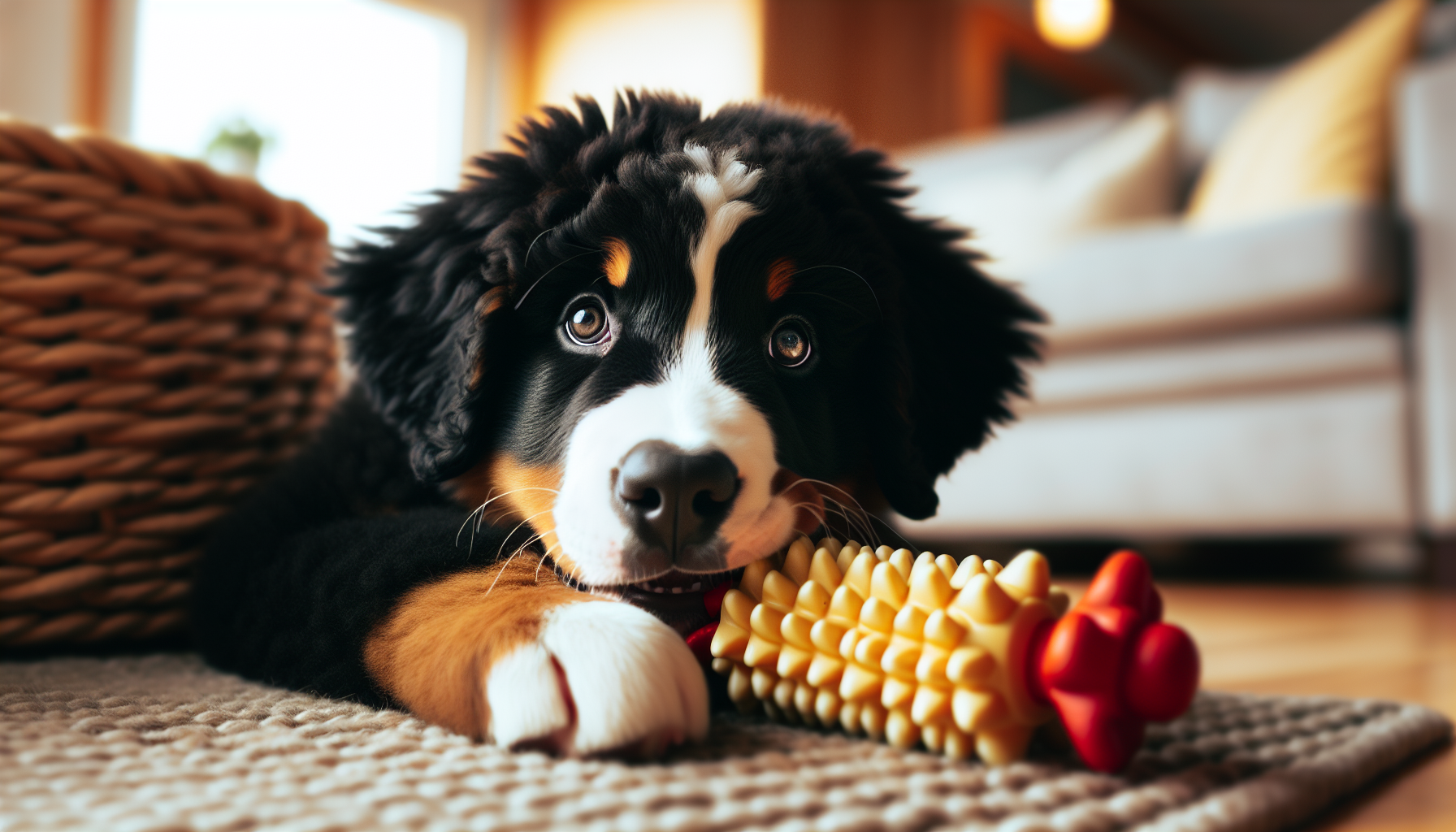If you’ve recently brought home a lovable Bernese mountain dog puppy, you may already be experiencing the sharp little teeth sinking into your hands and clothes. While biting is a common behavior in puppies, it’s essential to address it early on to prevent any future problems. In this article, we will share seven effective strategies that can help you put an end to your Bernese mountain dog puppy’s biting habit. From positive reinforcement techniques to providing appropriate chew toys, we’ve got you covered. Say goodbye to those nips and hello to a well-behaved and gentle furry friend!
Understanding the Behavior
Determining the Cause of Biting
Understanding why your Bernese Mountain Dog puppy is biting is an essential step in addressing the behavior. Puppies often bite during play as a way to explore the world and engage with their surroundings. However, if the biting becomes excessive or aggressive, it could be a sign of other underlying issues. These may include fear, anxiety, or a lack of proper socialization. By observing your puppy’s behavior and consulting with a professional, you can determine the cause of the biting and develop an appropriate plan to address it.
Recognizing Normal Puppy Behavior
It is crucial to distinguish between normal puppy behavior and problematic biting. Puppies use their mouths to explore the world, especially during their teething phase. They may nibble, mouth, or play-bite as a way to interact with their environment. However, this behavior should not be confused with aggressive biting, which can cause harm or distress. Understanding the difference will help you respond appropriately and train your Bernese Mountain Dog puppy effectively.
Knowing When Biting Becomes a Problem
While some biting is expected during the puppy phase, it is essential to recognize when the biting crosses the line and becomes a problem. If your Bernese Mountain Dog puppy bites too hard, shows signs of aggression, or causes injury, it is crucial to address the issue promptly. Biting can lead to unwanted consequences in adulthood if not properly managed. By being vigilant and proactive, you can effectively manage and discourage excessive biting behaviors.
Physical and Mental Stimulation
Providing Sufficient Exercise
One effective way to address biting behavior is to ensure that your Bernese Mountain Dog puppy receives sufficient physical exercise. Engaging in stimulating activities like daily walks, outdoor playtime, or fetch can help burn off excess energy and reduce the likelihood of biting. Regular exercise is vital for a happy and healthy puppy, as it promotes physical well-being and mental stimulation.
Engaging in Interactive Play
Interactive play sessions can help redirect your puppy’s biting tendencies. Encourage your Bernese Mountain Dog puppy to chase after toys, play tug-of-war, or participate in other games that promote interaction and engagement. By providing alternative outlets for your puppy’s energy and excitement, you can redirect their biting behavior towards appropriate play objects and discourage biting humans or furniture.
Mental Stimulation through Puzzle Toys
In addition to physical exercise, mental stimulation is crucial for a well-rounded Bernese Mountain Dog puppy. Puzzle toys, such as treat-dispensing puzzles or interactive chew toys, can keep your puppy’s mind engaged and provide an outlet for their chewing needs. By keeping your puppy mentally occupied, you can reduce their urge to bite out of boredom or frustration.

Positive Reinforcement Training
Using Positive Reinforcement Techniques
positive reinforcement training is a highly effective method for teaching your Bernese Mountain Dog puppy appropriate behavior. By using rewards such as treats, praise, or playtime, you can reinforce positive behaviors and encourage your puppy to learn and obey commands. Positive reinforcement builds trust and strengthens the bond between you and your puppy, making them more receptive to training and less likely to resort to biting.
Rewarding Good Behavior
Consistently rewarding your Bernese Mountain Dog puppy for good behavior is an essential aspect of positive reinforcement training. Whenever your puppy displays appropriate behavior or refrains from biting, shower them with praise, offer a treat, or engage in a favorite play session. This positive association helps your puppy understand what is expected of them and encourages them to repeat these desirable behaviors.
Redirecting Biting with Toys
When your Bernese Mountain Dog puppy starts to bite, redirect their attention to appropriate chew toys or interactive playthings. Keep a variety of chew toys at hand and offer one whenever your puppy engages in undesirable biting behavior. By consistently redirecting them to chew toys, you teach your puppy what they are allowed to bite and chew on, reducing the urge to bite people or household items.
Socialization and Exposure
Introducing Your Puppy to Various Environments
Proper socialization is crucial for raising a well-behaved and non-aggressive Bernese Mountain Dog. From an early age, expose your puppy to various environments, sounds, sights, and people. Gradually increase the level of exposure to different stimuli, ensuring that your puppy feels comfortable and confident in new situations. This exposure helps your puppy develop positive associations and reduces fear or anxiety-induced biting.
Positive Experiences with People and other Animals
Creating positive experiences for your Bernese Mountain Dog puppy with people and other animals fosters proper socialization. Encourage controlled interactions with friendly and well-mannered dogs, as well as exposure to kind and understanding individuals of all ages. These positive encounters help your puppy develop social skills and reduce the likelihood of fear or aggression-induced biting.
Enrolling in Puppy Classes or Socialization Groups
Consider enrolling your Bernese Mountain Dog puppy in puppy classes or socialization groups. These environments provide structured opportunities for your puppy to interact with other dogs under the guidance of a professional trainer. Puppy classes also teach essential obedience skills and reinforce desired behaviors through positive reinforcement. Through regular sessions, your puppy will learn proper play etiquette, impulse control, and bite inhibition.

Teaching Bite Inhibition
Establishing the Threshold for Acceptable Biting
Teaching bite inhibition is crucial to prevent your Bernese Mountain Dog puppy from causing harm when interacting with humans or other animals. Begin by setting a clear threshold for acceptable biting during play. When your puppy bites too hard, let out a high-pitched yelp to mimic the sound of hurt littermates. This yelping signals to your puppy that their bite was too forceful, teaching them to be more gentle in their interactions.
Reacting Appropriately to Nipping or Biting
When your Bernese Mountain Dog puppy nips or bites, react appropriately to discourage the behavior. Avoid harsh punishment or physical force, as this can escalate the situation or lead to fear-based aggression. Instead, use redirection, time-outs, or a stern “no” command to convey that biting is unacceptable. Consistency in your responses will help your puppy understand what is expected of them and encourage them to modify their behavior.
Gradually Reducing the Bite Pressure
As your Bernese Mountain Dog puppy learns bite inhibition, gradually reduce the bite pressure during play. If they are consistently using a gentle mouth, continue to reinforce and reward this behavior. Over time, your puppy will learn to control the force of their bites, making playtime safer and more enjoyable for everyone involved.
Consistency and Boundaries
Establishing Clear Rules and Boundaries
Consistency in establishing clear rules and boundaries is key to addressing biting behavior effectively. Clearly communicate to your Bernese Mountain Dog puppy what is allowed and what is not through consistent reinforcement of desired behaviors and redirecting unwanted biting. By maintaining a routine and enforcing these rules, you create a sense of structure that helps your puppy understand and respect boundaries.
Avoiding Rough Play or Tug-of-War Games
While playtime is essential for your Bernese Mountain Dog puppy’s physical and mental well-being, it is important to avoid rough play or tug-of-war games that may encourage biting. These activities can inadvertently reinforce aggressive behavior and make it difficult for your puppy to distinguish between appropriate play biting and actual aggression. Instead, focus on engaging in gentle and interactive play that encourages positive behavior.
Implementing Time-Outs or Ignoring Bad Behavior
If your Bernese Mountain Dog puppy persistently engages in biting despite your efforts, implementing time-outs or ignoring bad behavior can be an effective strategy. When your puppy bites or becomes overly excited, calmly and silently remove yourself from their presence for a short period. This teaches your puppy that their biting behavior results in a loss of attention or playtime, encouraging them to seek alternative ways to interact with you.
Proper Handling Techniques
Handling your Puppy Gently and Calmly
Properly handling your Bernese Mountain Dog puppy with gentleness and calmness is essential to build trust and reduce the likelihood of biting. Avoid sudden or rough movements that may startle or intimidate your puppy. Instead, approach them with a calm demeanor, using slow and deliberate movements to ensure they feel safe and secure.
Avoiding Rough or Sudden Movements
Bernese Mountain Dog puppies, like most puppies, can become excitable or fearful when confronted with rough or sudden movements. To minimize the risk of biting or heightened anxiety, refrain from making sudden movements or engaging in rough play that may trigger your puppy’s natural instinct to bite. By consistently providing them with a calm and predictable environment, you can help reduce the likelihood of biting behavior.
Teaching Your Puppy to Be Comfortable with Touch
Building your Bernese Mountain Dog puppy’s tolerance to touch is an important aspect of preventing biting. Begin by gently touching various parts of your puppy’s body, starting with less sensitive areas such as their back or shoulders. Gradually introduce more sensitive areas, such as their paws or ears, by associating touch with positive experiences, such as treats or praise. With time and consistency, your puppy will learn to be comfortable with touch, reducing the risk of biting during grooming or handling.
Discouraging Teeth-on-Skin Contact
Providing Appropriate Chew Toys
To redirect your Bernese Mountain Dog puppy’s biting behavior away from your skin, offer a variety of appropriate chew toys. Choose durable and safe toys that your puppy enjoys chewing on, such as rubber or nylon toys specifically designed for teething puppies. By providing suitable alternatives, you can satisfy their natural chewing instincts and discourage them from biting people or household items.
Using Bitter Apple Spray or Citrus Scents
If your Bernese Mountain Dog puppy persistently engages in biting or chewing inappropriate objects, you can use bitter apple spray or citrus-scented products as a deterrent. These sprays have an unpleasant taste or scent that discourages your puppy from mouthing or biting on items treated with them. Always follow the instructions on the product label and consult with your veterinarian before using any sprays or scents on your puppy.
Avoiding Rough Play that Encourages Biting
Some types of rough play, such as wrestling or games that involve grabbing or tugging, may inadvertently encourage biting behavior. It is important to set boundaries during playtime and avoid engaging in activities that mimic aggressive behavior. Instead, focus on gentle and interactive play that promotes positive interactions and discourages biting.
Seeking Professional Help
Consulting with a Professional Dog Trainer or Behaviorist
If your efforts to address your Bernese Mountain Dog puppy’s biting behavior are not yielding satisfactory results, consider seeking the assistance of a professional dog trainer or behaviorist. These experts can assess your puppy’s specific needs and provide personalized guidance and training techniques to address the biting behavior. Their expertise and knowledge will help you develop a tailored plan to effectively manage the issue.
Getting Advice from Experienced Bernese Mountain Dog Owners
In addition to professional help, reaching out to experienced Bernese Mountain Dog owners for advice can provide valuable insights and support. Join online forums or dog owner communities where you can connect with others who have successfully navigated through similar challenges. Learning from their experiences and recommendations can offer a fresh perspective and additional strategies to address your puppy’s biting behavior.
Addressing Potential Underlying Problems
Sometimes, biting behavior in Bernese Mountain Dog puppies can be a result of underlying health issues or emotional distress. If your puppy’s biting persists despite implementing various training strategies, it is essential to consult with a veterinarian to rule out any medical or behavioral conditions that may be contributing to the behavior. A thorough evaluation will help address any underlying problems and ensure that your puppy receives the appropriate care and treatment.
Patience and Persistence
Understanding that Biting is a Normal Developmental Stage
It is crucial to understand that biting is a normal developmental stage for Bernese Mountain Dog puppies. Just like human babies explore the world through mouthing and biting, puppies use their mouths to learn about their environment. By recognizing this phase as a natural part of their growth, you can approach the biting behavior with patience and persistence, knowing that consistent training and guidance will eventually lead to improved behavior.
Staying Consistent with Training Methods
Consistency is key when addressing biting behavior in Bernese Mountain Dog puppies. Stick to the training methods that have proven effective for your puppy, and avoid sending mixed signals. Be patient and diligent in reinforcing desired behaviors and redirecting unwanted biting. Consistency will help your puppy develop a clear understanding of what is expected of them and accelerate their progress in overcoming biting habits.
Celebrating Progress and Being Patient
Slow progress is still progress. Celebrate the small victories as your Bernese Mountain Dog puppy learns and grows. Each time they choose not to bite or engage in appropriate play, acknowledge and reward their good behavior. Remember that overcoming biting habits takes time and patience. By maintaining a positive attitude, staying consistent with training, and celebrating every step forward, you and your puppy will overcome the biting challenge together.
